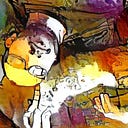Very cool article! Lately I have been wondering if we had too many subatomic particles.
Do you know how new particles are reconciled by chance? Have we defined a transition point between classical physical matter and quantum energy fields/packets? If mass and energy are technically the same (both are Vcs units now) then it may just be another state of matter like ice is another state of water.
If we already passed that threshold but are keeping the "particle" part of the physical concept with us as we go down then we could just be splitting the same energy field down to the limit of detection with our instruments. That might mean that the "particles" we are seeing past that point might actually be something like concentrated flows of quantum level energy similar to flowing currents and eddy's. We do already have electrohydrodynamics and magnetohydrodynamics that try to explain similar physical phenomena as a type of fluid.
Where does the 8 come from and why not 9? I've thought about this so let me know what you think. In our mathematics we usually denote one rotation around a circle as 0-100% or 0-1 of a whole of something. This is on our unit circle. We can split any circle indefinitely which makes it useful for statistics and calculus. If you split a circle into quadrants, which is usually how we see it, and we split those quadrants in half you get your total of 8. You could just as easily divide that total quantity evenly by taking geometric cuts using square roots or even cube roots. They intersect at powers of 1/6 for perfect cubes.
If that sounds familiar it is because that is how we generate fractal patterns like the Mandelbrot set. If we don't know for sure when matter is completely wave-like vs a particle then we might just be taking energy and splitting it indefinitely. Maybe we already have all the pieces but sailed past the finish line without noticing?
If we can encode information of infinite complexity into binary then do we have any reason to think the universe isn't at least as efficient?
Thanks!
